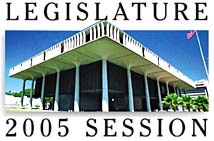Officials say schools
are in for rough swim
Isle lawmakers react
to a report on the No
Child Left Behind law
State education officials said yesterday a national report released this week spotlights the challenge Hawaii faces in meeting the dictates of the federal No Child Left Behind law.
|
|
"NCLB is a well-intentioned but flawed law," said Roy Takumi, chairman of the House Education Committee. "It is premised on a one-size-fits-all when in fact there are 16,000 school districts in the country that vary widely in the students they serve."
The scathing 77-page report from the National Conference on State Legislatures, released Wednesday, called Bush's signature education initiative underfunded, coercive and unconstitutional for meddling in education, typically a state responsibility.
It also said the law's goal of getting 100 percent of children proficient in reading and math by 2014 is "admirable but absolutely unattainable" and puts states at constant risk of lawsuits when schools fall short and claim they were underfunded.
"We don't want to dumb down the system, but how can you have 100 percent of kids excelling when schools don't even have 100 percent who graduate?" asked Norman Sakamoto (D, Salt Lake-Foster Village), the state Senate's education chairman.
As a bipartisan statement from all 50 legislatures, the report is significant for its sweep and tone, underscoring tensions over which level of government has final say over education.
Takumi (D, Pearl City-Pacific Palisades) said that a few years from now, "NCLB will look very different than it does today" because the state and federal governments will realize certain goals are unreachable or do not work in certain parts of the country, including Hawaii.
For example, students at consistently underperforming schools are allowed the option of transferring to a better-performing school, an option that is of little use to students on Lanai or Molokai, where school choices are limited, he said.
"Right now it's either a 'you are with us or you aren't' approach, and that doesn't work," said schools Superintendent Pat Hamamoto.
Hamamoto said she would like to see changes that take into account where a school is located, calculate "doable" targets and recognize schools that show academic improvement even if they miss NCLB's incremental targets, or allow them more time to reach those targets.
However, she insisted the department does not advocate lowering standards.
"It's more about helping us to get to those standards," she said.
doe.k12.hi.us
State DOE: No Child Left Behind
doe.k12.hi.us/nclb/
U.S. DOE: No Child Left Behind
www.nochildleftbehind.gov
[News] [Business] [Features] [Sports] [Editorial] [Do It Electric!]
[Classified Ads] [Search] [Subscribe] [Info] [Letter to Editor]
[Feedback]

